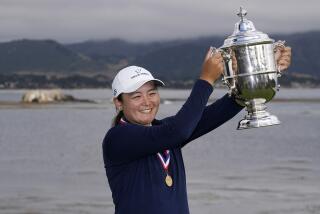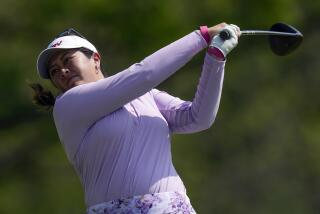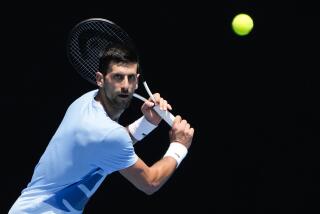West Germany’s Graf Joins Becker Near the Pinnacle of World Tennis
- Share via
FRANKFURT, West Germany — With a string of victories and her first major tournament title, Steffi Graf has moved out of two huge shadows.
One is cast jointly by Martina Navratilova and Chris Evert Lloyd, long ranked 1-2 in women’s tennis but both victims of Graf in the two-week International Players Championship this month.
The other is cast by another West German star, Boris Becker.
Graf’s steady rise to challenge Navratilova and Lloyd at the top of women’s tennis comes as Becker, a two-time Wimbledon champion, has faltered in his attempt to become the world’s No. 1 men’s player.
Graf finally has grabbed an equal share of West German headlines and television appearances with Becker.
And, with Graf, 17, and Becker, 19, West Germany’s tennis program is likely to remain strong for years.
“With Becker we have the No. 2 in the world, and with Graf we’ll probably have the No. 1 woman before the end of the year,” Niki Pilic, West Germany’s Davis Cup coach, said. “We have a lot of reasons to be happy with the situation of German tennis.”
Graf was born in Bruehl in central Germany. Becker’s family is from Leimen. The two villages are 12 miles apart, near Heidelberg, and Graf and Becker often practiced together at a local tennis camp.
Less than two years ago, Becker burst upon the world stage with his first Wimbledon triumph and has dominated the country’s sports pages since.
With established stars such as John McEnroe and Jimmy Connors starting to show their age, and his own game improving, Becker shot to the No. 2 spot behind Ivan Lendl.
But Lendl dominated their final meeting of 1986, and Becker has had an erratic start in 1987, winning one tournament but losing to lowly ranked Sergio Casal of Spain last Sunday in the first round of the Davis Cup.
“I never suffered such a defeat before,” Becker said. “But it happens. I will lose 1,000 more times in my life.”
Graf’s rise to stardom was less spectacular, but she, too, is now No. 2, behind Navratilova and ahead of Lloyd, whom she beat for the championship in the Key Biscayne, Fla., tournament. Her form appears to be more consistent than Becker’s, and she is content to wait for her moment.
“I don’t feel like No. 1 yet. I’m No. 2,” she said. “But I became No. 2 much faster than I expected. I did beat Navratilova and Evert Lloyd, but it’s not enough to make me No. 1 immediately. I have many years in front of me.”
While Becker seems to cultivate a jet-set image with his apartment in Monte Carlo and frequent trips to the discotheques, Graf comes across as the girl next door. Her personality made her a hit on German television.
Graf doesn’t have a boyfriend, says she can’t imagine a day without tennis and calls her father-manager, Peter Graf, “the most important man in my life--still.”
Another man in her life may have provided the boost she needed to grab for the top. Graf’s game appears to have improved since Pavel Slozil of Czechoslovakia was hired in January to be her coach.
Her strongest weapon is an awesome forehand. After losing in 59 minutes to Graf in the Key Biscayne final, Evert Lloyd said the West German has “one of the best if not the best forehand in women’s tennis.”
“There is no reason why Steffi can’t win all the major tournaments. She will be very hard to beat this year,” Evert Lloyd said.
Navratilova, who lost to Graf in a Key Biscayne semifinal that lasted just 56 minutes, said the teen-ager “today . . . is the best player in the world, and she will be the best until I beat her.”
Graf won eight tournaments in 1986, including the Berlin Open final over Navratilova, but no Grand Slam events. She was forced to withdraw from Wimbledon because of illness and was eliminated in the late rounds at both the French and U.S. opens.
“This is my target for 1987. I want to win a Grand Slam tournament,” Graf said.
Becker won six tournaments in 1986 and retained his Wimbledon singles title by beating Lendl in the final.
Unlike Graf, Becker seemed impatient to claim the No. 1 spot. He ended 1986 by winning three tournaments on three continents in three weeks.
Becker and his manager, Ion Tiriac, were quoted in West German newspapers as saying the teen-ager had a legitimate claim to No. 1 after winning three out of five encounters with Lendl in 1986.
But then came the season-ending Masters tournament in New York. Lendl dished out a tennis lesson to Becker in the final, beating him in three sets.
Becker conceded afterward that he still had to work to overtake Lendl, and he returned home to join Graf in receiving honors as West Germany’s man and woman athletes of the year.
Then came the Australian Open and one of the most difficult moments in Becker’s short career.
After a stormy exit in an early round, Becker parted company with his longtime coach Guenter Bosch.
Among the many reasons for the split cited in West German newspapers was Becker’s friendship with Benedicte Courtain, the 23-year-old daughter of a police official in Monte Carlo.
Bosch used to accompany Becker on all trips along with Tiriac, spending all the time with his protege both on and off the court. Much of that off-court time is now taken by Courtain, and Becker said he didn’t need a coach who would be around him all the time.
Becker remains in Monte Carlo when not playing, having moved there both for tax reasons and to escape the suffocating attention of his German fans.
Graf is a stay-at-home. After her Key Biscayne victory, she returned to West Germany for a ski vacation.
While she follows the fortunes of Becker, Graf says she is not envious of his fanatical following.
“No, really not,” she told the West German magazine “Quick” when asked if she considered Becker a rival for the attention of their country’s fans. “I am happy for him. It’s really great that he won Wimbledon when he won Wimbledon when he was only 17.”
More to Read
Go beyond the scoreboard
Get the latest on L.A.'s teams in the daily Sports Report newsletter.
You may occasionally receive promotional content from the Los Angeles Times.










